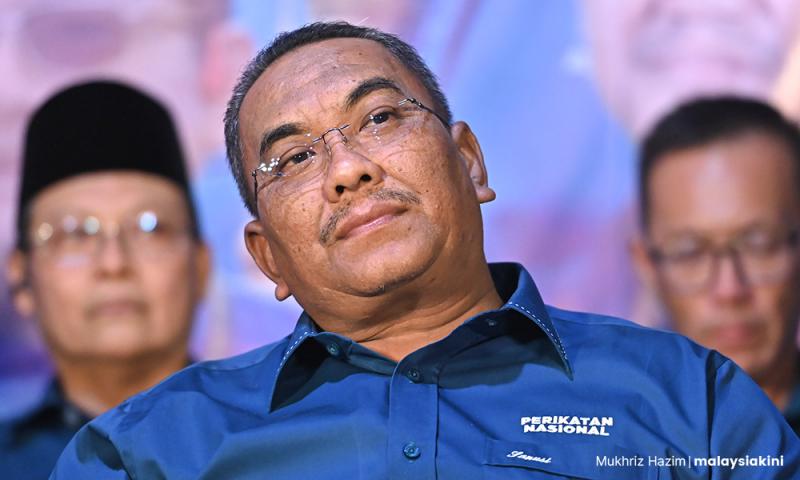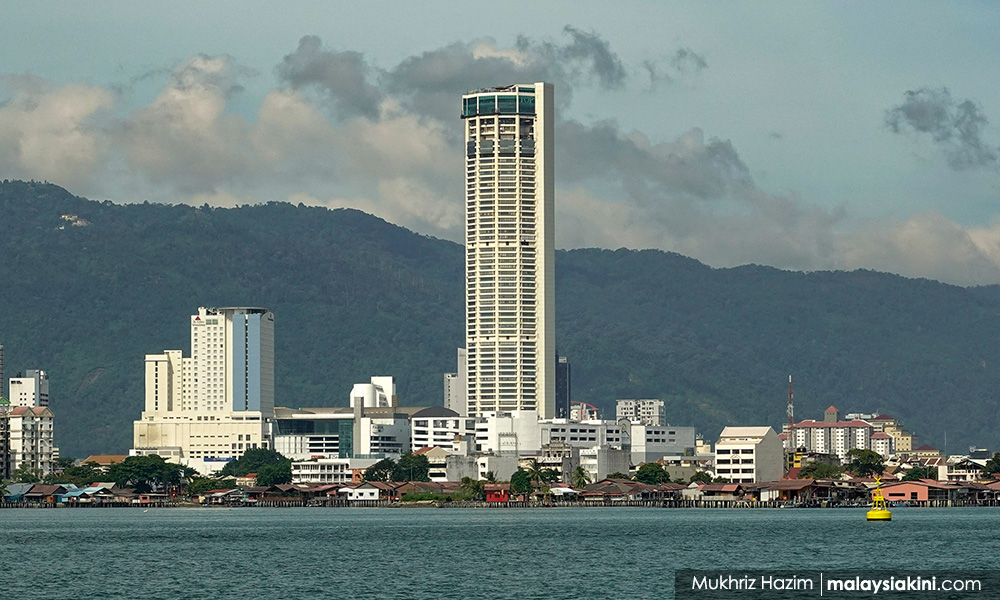
by Murale Pillai
COMMENT | Muhammad Sanusi Md Nor was recently sworn in as the Kedah menteri besar following the state elections. His politics is a heady mix of provocations, absurd claims, slurs, insults and gaffes - all well evidenced in the mainstream media and the alternative press.
Yes, it's hard to tell failed politicians from buffoons holding high office until it's too late. When in office, the former are ridiculed behind their backs for their actions like declaring a national emergency to suit their own ends or looting the treasury and coolly saying, "Who, me?"
Also, the plans and actions of failed politicians often defy reality like wanting a car industry without having an engineering base or wanting the country to be a world leader in some industry or technology without first going through the hard slog of acquiring knowledge and expertise.
Political buffoons, on the other hand, see themselves as non-stop action heroes. Backed by their faithful supporters, they revel in being provocative, often drawing attention to themselves and their masculinity. But managing the nitty-gritty of their high office is truly beyond them.
So, how do buffoons reach the top? Think Idi Amin, Boris Johnson and Donald Trump. They took political buffoonery to new heights using bluster and bluff, leaving behind a legacy of damage and distrust. In Latin, "buffoon" is a puff of wind and not an idiotic or stupid person.
All puffed up
In modern usage, a political buffoon is one who is all puffed up and a danger to others. Among Kedah folk, a person who takes excessive pride in his achievements or his status is snidely referred to as kembang macam katak (puffed up like a frog). What a delightful idiom!
Though full of air, political buffoons are not fools. They deliberately act the fools to both amuse and stay connected with their core supporters. Buffoonery is part of that act. In the case of Amin, the word "buffoon" is by itself a complete description of his job functions.
As president of Uganda, Amin issued absurd and grandiose statements without let-up. He set up a “Save Britain Fund'', offering assistance to his former overlords. On another occasion, he made a few whites carry him in a palanquin around Kampala, calling it “The White Man's Burden”.
Some other favourites: the Ugandan leader challenged president Julius Nyerere of Tanzania to a boxing match; he was ‘deeply impressed’ by Maggie Thatcher’s 'fresh and charming' looks; he sent telegrams to the Queen, supporting the 'liberation struggles' of the Welsh, Scots and Irish.
His buffoonery made his opponents underestimate his cunning and his ruthlessness, and also confused and distracted them. It also provided deniability, allowing him to claim it was all a joke when caught out. You couldn't tell whether he was joking, serious or seriously joking.
Like power, political buffoonery hates a vacuum. Peeling off his track top in a stadium, Sanusi barred his barrel chest with a stern smile to the delight of his followers. In some other place and time, he delivered a mighty punch to the face of a rubber doll in a mall to much cheering.
COMMENT | Muhammad Sanusi Md Nor was recently sworn in as the Kedah menteri besar following the state elections. His politics is a heady mix of provocations, absurd claims, slurs, insults and gaffes - all well evidenced in the mainstream media and the alternative press.
Yes, it's hard to tell failed politicians from buffoons holding high office until it's too late. When in office, the former are ridiculed behind their backs for their actions like declaring a national emergency to suit their own ends or looting the treasury and coolly saying, "Who, me?"
Also, the plans and actions of failed politicians often defy reality like wanting a car industry without having an engineering base or wanting the country to be a world leader in some industry or technology without first going through the hard slog of acquiring knowledge and expertise.
Political buffoons, on the other hand, see themselves as non-stop action heroes. Backed by their faithful supporters, they revel in being provocative, often drawing attention to themselves and their masculinity. But managing the nitty-gritty of their high office is truly beyond them.
So, how do buffoons reach the top? Think Idi Amin, Boris Johnson and Donald Trump. They took political buffoonery to new heights using bluster and bluff, leaving behind a legacy of damage and distrust. In Latin, "buffoon" is a puff of wind and not an idiotic or stupid person.
All puffed up
In modern usage, a political buffoon is one who is all puffed up and a danger to others. Among Kedah folk, a person who takes excessive pride in his achievements or his status is snidely referred to as kembang macam katak (puffed up like a frog). What a delightful idiom!
Though full of air, political buffoons are not fools. They deliberately act the fools to both amuse and stay connected with their core supporters. Buffoonery is part of that act. In the case of Amin, the word "buffoon" is by itself a complete description of his job functions.
As president of Uganda, Amin issued absurd and grandiose statements without let-up. He set up a “Save Britain Fund'', offering assistance to his former overlords. On another occasion, he made a few whites carry him in a palanquin around Kampala, calling it “The White Man's Burden”.
Some other favourites: the Ugandan leader challenged president Julius Nyerere of Tanzania to a boxing match; he was ‘deeply impressed’ by Maggie Thatcher’s 'fresh and charming' looks; he sent telegrams to the Queen, supporting the 'liberation struggles' of the Welsh, Scots and Irish.
His buffoonery made his opponents underestimate his cunning and his ruthlessness, and also confused and distracted them. It also provided deniability, allowing him to claim it was all a joke when caught out. You couldn't tell whether he was joking, serious or seriously joking.
Like power, political buffoonery hates a vacuum. Peeling off his track top in a stadium, Sanusi barred his barrel chest with a stern smile to the delight of his followers. In some other place and time, he delivered a mighty punch to the face of a rubber doll in a mall to much cheering.

He also made the outrageous claim that Penang belonged to Kedah, ignoring the various agreements going back to the Anglo-Siamese Treaty of 1909 that secured Kedah's full independence from Siam and the seminal Federation of Malaya Agreement of 1948.
He made sly references to Indians and toddy, went on a temple demolition spree, used impolite Hokkien words to describe male genitalia, accused the government of blocking "Kedah Aerotropolis" and called African footballers Awang Hitam, our "N" word equivalent.
He admitted to dealing with a Chinese national to work the state's rare earth deposits, claiming in a speech that it was valued at RM43 trillion and that these deposits were granted by God to Kedah. The value of the deposits was later revised downward to RM62 billion.
Then out of the blue came the uncalled-for comparison between the sultans of Kedah and Selangor in which he claimed his appointment as menteri besar was proof of the Kedah sultan’s ability and good judgment while the appointment of his counterpart in Selangor was a botched job.
His political base lapped all this up, unbothered that his gaffes were nothing more than him accidentally telling the truth or that his claims were utterly baseless. His arrest in the middle of the night for insulting the Sultan of Selangor allowed him to play the victim card.

Then a few days ago, he gave a young lady a public swatting with a rolled-up sheet of paper. Her mother, calling it a small matter, appealed to the press to not make a mountain out of a molehill. She doesn't know Sanusi well enough: he can never say "enough" to publicity.
He has grabbed eight state executive council portfolios for himself. What will he do next? He may get puffed up like a frog when rare earth money pours in, never mind that parts of Kedah may look like the South Pole of the moon. He might insist on a rare earth metal be renamed Kedahrium. Perhaps even Sanusium.
This reminds me of that apocryphal story about Amin insisting that Uganda be renamed "Idiland" until the courageous law minister said, without raising his head, that far away in the Mediterranean is an island called Cyprus whose citizens are called Cypriots.
Be afraid. Be very afraid.
No comments:
Post a Comment